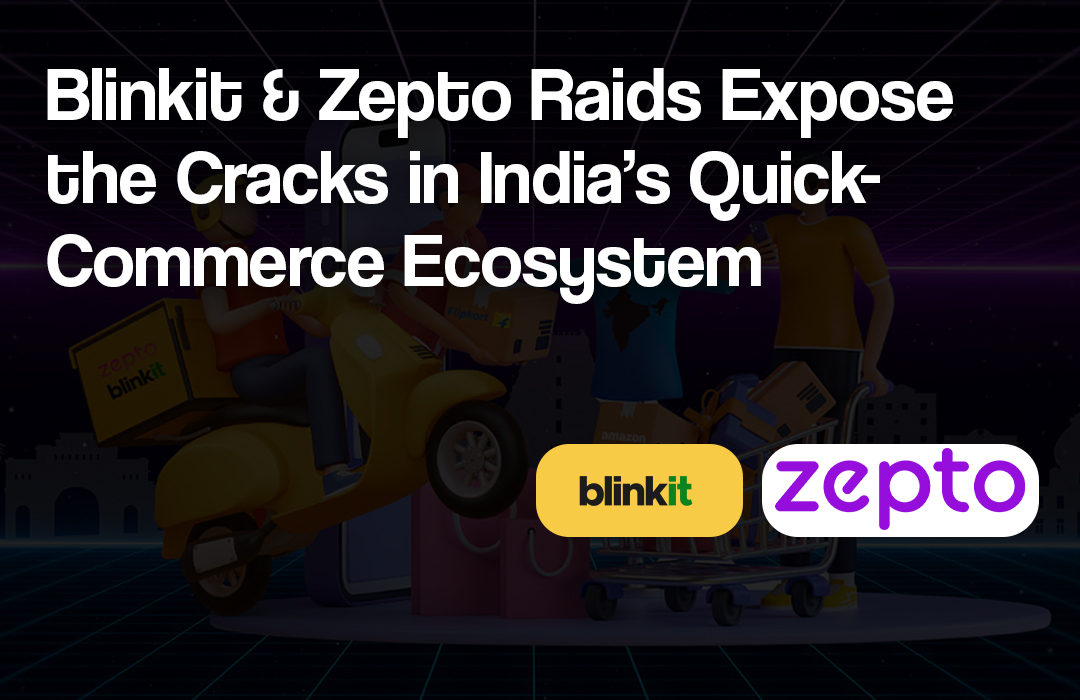Thestartupcaffe – PR, Social Media & Podcast Platform for Startups
Blinkit & Zepto Raids Expose the Cracks in India’s Quick-Commerce Ecosystem

India’s quick-commerce sector is growing fast perhaps too fast for its own good. Promising deliveries in under 10 minutes, companies like Blinkit, Zepto, and Instamart have scaled dark store operations at lightning speed. But recent FDA raids and hygiene violations are forcing a harsh reckoning with the operational risks behind the speed.
From expired food to storage lapses, the cracks are becoming too visible to ignore. For founders, investors, and consumers, this moment offers more than headlines, it signals a structural need for compliance, discipline, and trust-building.
Why the Zepto and Blinkit Raids Are a Wake-Up Call
In April 2025, the Maharashtra Food and Drug Administration suspended a Blinkit store’s food license in Pune’s Balewadi area due to multiple hygiene violations. Around the same time, a Zepto dark store in Mumbai was also raided, although its suspension was later revoked. What regulators found was disturbing: wet floors, fungal contamination, substandard refrigeration, and expired inventory.
These incidents are not isolated. They reflect an industry-wide trend where the push for delivery speed is outpacing the development of sound backend operations. Compliance with Schedule 4 of the FSSAI Act which governs hygiene protocols in food businesses is now being enforced with random checks across cities.
The Operational Risk Behind Every 10-Minute Delivery
Dark stores operate in a grey area neither conventional grocery stores nor industrial warehouses. They are small fulfillment centers optimized for speed, not safety. Staff often lack formal training in food handling. Inventory turnover is prioritized over quality audits. And franchise-led models make it harder to control daily SOPs.
In Telangana, a Blinkit outlet was earlier flagged for expired fruits and vegetables. Without real-time quality monitoring and digital traceability, such violations are bound to continue. For quick-commerce to be scalable, hygiene cannot remain optional, it must become operational DNA.
What Founders and VCs Need to Prioritize Now
India’s quick-commerce players are seeing big valuations. Zepto has surpassed $5 billion, with over 250 stores. Blinkit delivers in more than 30 cities and completes over 125,000 orders daily. But underneath the unicorn glow, poor compliance can erode consumer trust and trigger regulatory blocks.
Founders need to invest in full-stack audit systems, from AI-based shelf tracking to cloud-logged cold chain monitoring. SOPs should include mandatory staff hygiene certifications, expiry tracking, and daily operational checklists. Investors must assess risk not just from a unit economics lens but through regulatory liability as well.
Public Sentiment and Regulatory Pressure Are Mounting
The public backlash following exposés and regulatory notices has already been palpable. Residents in Pune and Mumbai are now questioning whether sourcing from street vendors isn’t safer. That tension could impact quick‑commerce platforms unless they proactively engage consumers and regulators.
On the regulatory front, moves like Maharashtra FDA’s random sampling suggest a hardening stance. Schedule 4 FSSAI compliance is no longer optional. Quick‑commerce brands must anticipate regular inspections not as adversities but as checkpoints in professionalising the business.
The Future of Quick – Commerce Depends on Trust
This isn’t just a wake‑up call, it’s a turning point. India’s quick‑commerce industry is estimated to become a $40 billion sector by 2030. To reach that critical mass, it will require strong operational discipline. Scalability must sit alongside safety. Growth metrics must couple with hygiene scores. Consumer loyalty will align with transparency, not just ultra‑fast delivery.
Quick‑commerce is no longer a convenience novelty, it’s become a repeat purchase category. And as it transitions from scale‑up stories to mass‑market favorites, the backend infrastructure becomes the bedrock of enduring success.
Stay Tune with Startup Caffe
At Startup Caffe, we decode not just startup trends, but the structural shifts that shape tomorrow’s economy. The recent Zepto and Blinkit incidents are not just regulatory bumps, they are early warnings for an industry racing ahead of its backend infrastructure.
As we continue tracking India’s startup evolution, our mission remains clear — to equip founders, investors, and innovators with insight-driven stories that cut through the noise. Follow Startup Caffe for weekly updates on funding rounds, regulatory signals, and innovation that builds sustainably.






